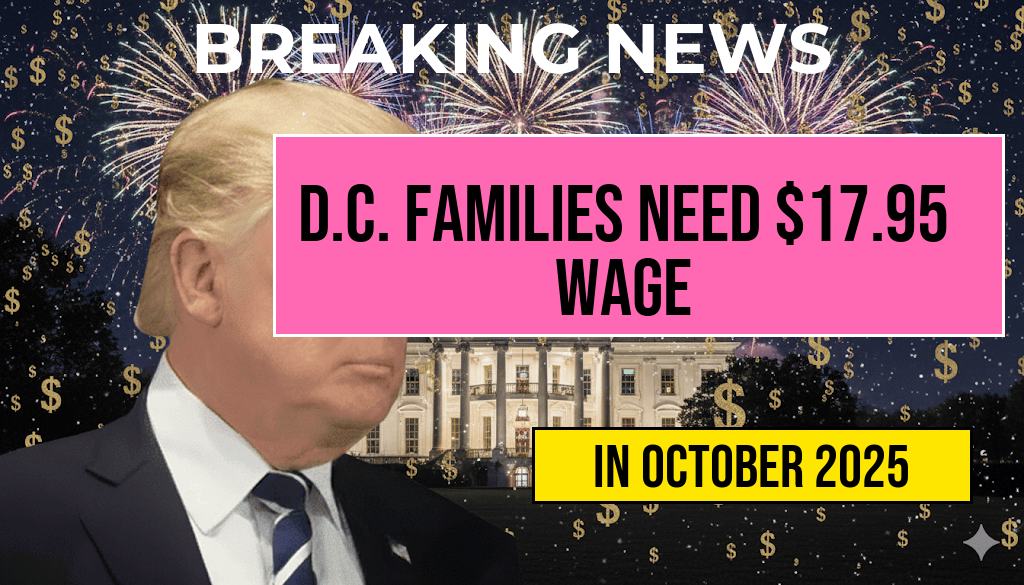DC Families Require a $17.95 Minimum Hourly Wage to Meet $3,111 Monthly Income Before Taxes
For families living in Washington, D.C., earning a full-time income that covers basic expenses and maintains a modest standard of living demands a minimum hourly wage of approximately $17.95. This rate translates into a gross monthly income of about $3,111 for a standard 40-hour workweek, before taxes and deductions. Despite recent adjustments to minimum wage laws, many residents find that their earnings still fall short of covering essential costs such as housing, childcare, transportation, and healthcare. Experts highlight that the current wage floor remains insufficient for a typical family to achieve financial stability in the nation’s capital, prompting ongoing discussions around wage policies and affordability measures.
Calculating the Necessary Wage: The Numbers Behind Living Costs
Determining the income needed for a family to thrive in D.C. involves analyzing the city’s high living expenses. According to recent data from the U.S. Bureau of Labor Statistics and local housing agencies, the average rent for a two-bedroom apartment can surpass $2,500 per month. Add to that the costs of child care, transportation, groceries, and healthcare, and the monthly budget quickly exceeds what a minimum wage earner can comfortably support.
To meet a monthly income of $3,111 before taxes, a worker must earn approximately $17.95 per hour, assuming a standard 40-hour workweek across four weeks. This figure accounts for the fact that federal and state taxes, along with Social Security and Medicare contributions, will reduce take-home pay. The calculation emphasizes that even marginal increases in hourly wages could significantly improve the financial outlook for many families.
Current Wage Policies and Gaps in Coverage
The District of Columbia has progressively increased its minimum wage over the past few years. As of 2023, the minimum wage stands at $16.10 per hour for large employers, with smaller businesses subject to lower thresholds. While these figures represent substantial improvements over previous decades, they still lag behind the estimated $17.95 needed for a family to comfortably meet basic living costs, according to local economic studies.
Advocates argue that the gap between the existing minimum wage and the calculated living wage underscores the need for further policy adjustments. “Many families are working full-time but still struggling to cover essential expenses,” said living wage advocates. “Raising wages closer to $18 an hour could significantly reduce poverty levels and improve quality of life.”
Impact on Families and the Local Economy
For families, earning the necessary wage can mean the difference between financial stress and stability. A full-time worker earning $17.95 per hour can better afford housing, healthcare, and education costs, reducing reliance on public assistance programs. This, in turn, could lead to broader economic benefits, including increased consumer spending and reduced healthcare costs associated with stress-related illnesses.
However, some business owners express concerns about rising labor costs. “While supporting fair wages is essential, small businesses may face challenges if wage increases are implemented abruptly,” noted business analysts. Policymakers are exploring phased approaches and targeted subsidies to balance economic growth with fair compensation.
Comparative Wage Benchmarks and Future Outlook
| Wage Type | Amount | Applicable For |
|---|---|---|
| Current Minimum Wage | $16.10 | Large Employers |
| Proposed Living Wage | $17.95 | Full-time family support in D.C. |
| Average Household Income | $75,000 | Median household in D.C. |
Looking ahead, policymakers and advocacy groups continue to debate how best to address the wage gap. Proposals include raising the minimum wage further, expanding earned income tax credits, and implementing affordable housing initiatives. As the city’s economy evolves, aligning wages with living costs remains a central challenge to ensuring that full-time work provides a pathway out of poverty for D.C. families.
For more detailed insights on wage standards and economic conditions, visit Wage Law on Wikipedia and Forbes on Fair Wages and Economic Growth.
Frequently Asked Questions
What is the minimum wage needed for D.C. families to earn a monthly income of $3,111 before taxes?
Families in D.C. need a minimum wage of $17.95 per hour to earn a monthly income of $3,111 before taxes for full-time work.
How is the required minimum wage calculated for families in D.C.?
The required minimum wage is calculated based on the desired monthly income divided by the average number of work hours in a month, ensuring full-time workers meet their income goals.
Does the $17.95 minimum wage account for taxes and other deductions?
No, the $17.95 figure represents the gross hourly wage needed before taxes and deductions to reach the $3,111 monthly income goal.
Why is a $17.95 minimum wage important for families in D.C.?
The $17.95 minimum wage is essential for families to cover basic expenses and achieve financial stability, reflecting the local cost of living and affordability in D.C.
How does this minimum wage compare to current D.C. minimum wage laws?
The current minimum wage in D.C. may be lower or higher; this article highlights the necessary wage of $17.95 to meet specific income needs, which may inform ongoing policy discussions and wage adjustments.









